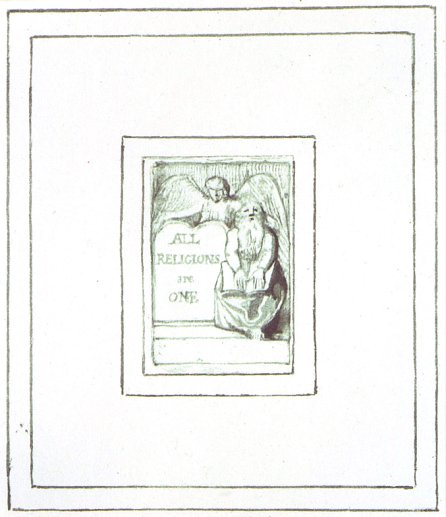

View all the 10 Plates of All Religions Are One (E 1) in the Blake Archive.
It could be said that Blake began his prophetic ministry with the little book, All Religions Are One (of which only one copy survives). A close look at it will give us a concise preview of his message, his methods and his goal: "the desire of raising other men into a perception of the infinite." My comments on the poem are in blue.
Plate 1
The ministry of John the Baptist was a lonely one. He placed himself outside of his tribe, living in the wilderness and depriving himself of the normal comforts of life. His role was that of a forerunner for the prophet who was to follow him. Blake identified with the role of the outsider who choose to have his voice heard with the aim of pointing toward a new age. (Matthew 3)
All Religions Are One
Each religion claims uniqueness and exclusive access to God and truth. Not so asserts Blake. Religions can be united as one.
The ArguementAs the true meth-
-od of knowledge
is experiment,
the true faculty
of knowing must
be the faculty which
experiences. This
faculty I treat of.
Our knowledge is acquired through our experience. The faculty through which we gain experience will be the subject of this argument. The argument will not be based on authority or second hand knowledge.
Principle 1st That the Poetic Genius is
the True Man, and that
the body or outward form
of Man is derived from the
Poetic Genius. Likewise
that the forms of all things
are derived from their
Genius, which by the
Ancients was calld an
Angel & Spirit & Demon.
The outer form or appearance of man is not the True Man. The spirit which resides in Man and in all things is what the outer forms derive from.
As all men are alike in
outward form, So (and
with the same infinite
variety) all are alike in the Poetic Genius
Humanity shares some qualities in spite of outer variety of appearance. So does man share the inner spiritual nature.
Principle 3rd No man can think write
or speak from his
heart, but he must intend
truth. Thus all sects of
Philosophy are from the
Poetic Genius, adapted
to the weaknesses of
every individual.
All humanity intends to speak truth when he speaks from his inmost nature. Differences in philosophy result from individual weaknesses (inability to perceive the infinite).
Principle 4th As none by trave
ling over known
lands can find out
the unknown, So,
from already ac
quired knowledge
Man could not ac
quire more; there
fore an universal
Poetic Genius exists
Man is not dependent upon the knowledge which comes only from his individual experience because a Universal Source, the Poetic Genius, provides knowledge he cannot acquire elsewhere.
Principle 5th The Religions of all Nat-
-ions are derived from each
Nations different reception
of the Poetic Genius which
is every where call'd the Spi
rit of Prophecy
Different abilities to receive the Poetic Genius result in variety, although the Spirit of Prophecy is universally recognized.
Principle 6th The Jewish & Chris-
tian Testaments are
An original derivati-
-on from the Poetic Ge-
nius: this is necessary
from the confined natu
re of bodily sensation
The Old and New Testaments of the Bible although deriving from the Poetic Genius, result from limited perceptions according to the varied ability to perceive the Poetic Genius.
Principle 7th As all men are alike
(tho' infinitely vari
ous) So all Religions:
& as all similars have
one source,
The true Man is the
source, he being the
Poetic Genius
The true or inner man which is in touch with the Poetic Genius and is the Poetic Genius as experienced by each man as he journeys into his inner being, is indistinguishable from the Self as described by Carl Jung.
Here is an article by a psychologist on self and religion:
CARL JUNG AND HIS IDEAS ON SELF Stephen A. Martin, Psy.D.
"To Jung our Self was not our ego. Our Self was not who we thought we were. Our Self rather was who we really are, all of us, both the known and the unknown, the integrated and that which is yet to be integrated. Our perception of ourselves is hence our ego, but our true Self is a great deal more. "
I really have nothing of significance to add to what is said here, but as no one else has commented I though I would express my appreciation for your sharing this. I also have a great love for both Blake and Jung and see my own philosophical endeavours as very much illuminated by their work. It is such a shame that few people progress beyond Jerusalem and the Tiger.
ReplyDeleteThanks for your comment Michael. I think that the insights of Blake and Jung have seeped into the culture and exert more influence than is obvious on the surface.
ReplyDeleteBlake began publishing Illuminated Books with the tiny plates of 'All Religions Are One' and 'There Is No Natural Religion.' It was a small beginning and surely they were seen by few people in his day. With the World Wide Web Blake has new life and a larger audience than he could have imagined.
ellie